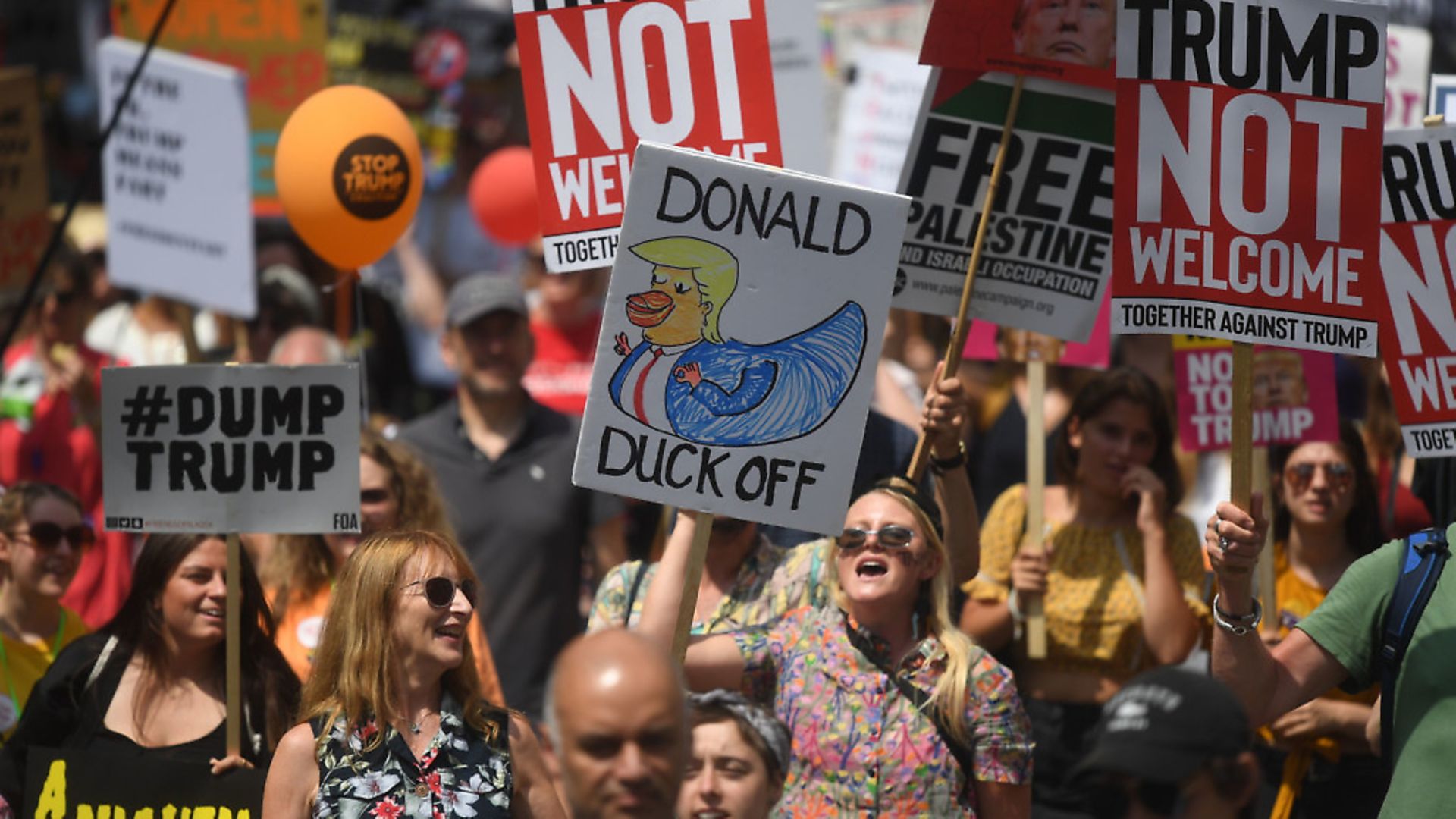
The protests against tuition fees, Grenfell, and Trump’s presidency have all evoked real anger. But that anger right now is missing from the Brexit fight. ANTONIA FLOOD says it’s time young people were more radical.
Discussion of UK protests, according to Google search results, shows a conversation entirely dominated by an American, Donald Trump.
The headlines tend to cover the nationwide protests held in the UK against his July visit, and not our domestic discourse. In part, this is a just reflection of the fact that many UK citizens realise that Trump is not only an American issue, but also a global one. And they’re quite right.
But does it not seem odd that it isn’t until late in the search results that protests about events and policies on our own doorstep start to appear? And that at that point, between the headlines mentioning the NHS, Grenfell, MeToo, Women’s rights, tuition fees – and other, far older examples, like Stop the War and the miners’ strike – there is only scant mention of that infamous B-word?
MORE: Why my hometown needs a People’s Vote more than most
Considering it commands the largest amount of airtime in the UK media of any single political issue, Brexit’s absence from my search results is depressingly telling about the situation at hand. Whilst it’s discussed and argued about endlessly, whether in the press or at the pub, that’s where protesting about Brexit seems to be staying – in the abstract realm of debates.
So why is it that an event which has caused the greatest division in the UK in years remains the stuff of conversations, not chants?
Why are people more likely to take to the streets for the NHS and period poverty than for an event whose consequences threaten to override the outcomes of any one of those single protests? Why does a subject momentous enough to warrant its own section in most newspapers never cause areas outside Parliament to be sectioned off for people and their placards?
What makes this situation more surprising is that it is occurring in the context of a general revival of protesting, especially in the young. Although not as violent or radical as our parents’ generation, whether it be under the banners of the March for Our Lives or at one of The Pink Protest’s events, young activism is back in fashion worldwide. At a protest outside Westminster last Christmas, as a 23-year-old, I felt bizarrely old.
MORE: Free coaches are taking activists to the People’s Vote March
The average age of the people who’d come out in the freezing cold to protest against period poverty was between 13 and 16. Lead by 17-year-old Amika George, the protest was successful; a few months afterwards, the government allocated £2m to combat period poverty in the UK. So why, when 75% of young people voted Remain, in a period of revitalised youth activism, are so few actively defending that choice?
For some, it’s because Brexit is so large and complicated that making a difference feels inaccessible. But as as the aptly acronymic Our Future, Our Choice (OFOC) youth-led campaign is showing – backed by the elder generation behind groups such as the overall People’s Vote campaign – the battle isn’t over, and nothing is yet set in stone. Indeed, it was these campaigns working in tandem that helped mobilise the largest anti-Brexit protest to date – the March for a People’s Vote that took place in June.
That this march – which saw more than 100,000 people join its ranks – didn’t come up in my Google search for “UK protests” might be something to do with the controversy over the BBC’s negligent coverage of the event. But it also points to what seems to be at the centre of Brexit’s activism issue – an issue of rhetoric, where we have marches for, but no protests against.
In general, people protest against things – against the government who saw the Grenfell tragedy occur under its watch; against the treatment of the Windrush generation; against Donald Trump being received on UK soil. Marches, on the other hand, are normally in support of something – for women’s rights; for the lives of America’s schoolchildren; for a People’s Vote on the final Brexit deal.
Whilst protests tend to be refusals to accept a current status quo, marches tend to be acts of empowerment over the future. But the most effective campaigns utilise the rhetoric behind both. Activism around Brexit now needs to do so too. With the UK’s youth at its helm, we now need to not only march for our future, but also protest against the current status quo – which, as the recent Labour and Tory conferences have shown, looks set to be farcically calamitous.
MORE: Stay angry and fight Brexit. Support our anti-Brexit journalism by subscribing here.
It is perhaps that farcical nature of the protracted two-year process which has made it easier to march in favour of clearly defined campaigns such as the People’s Vote, rather than against the ill-defined reality of Brexit, which can often feel intangible. But it is not so any longer – the very tangible deadline of March 29 is just around the corner.
The change in rhetoric needs to happen now. As the youth of the UK, we need to march not only for our future, but against the denial of our choice over what it looks like. It is much easier for the government to deny a new initiative than it is to ignore what people make clear that we will not accept.
MORE: All you need to know about the People’s Vote March
On the October 20, there is another March for a People’s Vote. The youth in this country must march, mobilising as effectively as we have shown we will for other causes. And when the march reaches Parliament Square, there had better be a protest at the end of it.









